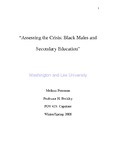| dc.rights.license | In Copyright | en_US |
| dc.creator | Poorman, Melissa | |
| dc.date.accessioned | 2013-12-10T15:48:53Z | |
| dc.date.available | 2013-12-10T15:48:53Z | |
| dc.date.created | 2008 | |
| dc.identifier | WLURG38_Poorman_POV_2008_wm | |
| dc.identifier.uri | http://hdl.handle.net/11021/24222 | |
| dc.description | Melissa Poorman is a member of the Class of 2008 of Washington and Lee University. | en_US |
| dc.description | Capstone; [FULL-TEXT FREELY AVAILABLE ONLINE] | en_US |
| dc.description.abstract | In recent years, Black males have been candidly described as an endangered species. This crisis of the Black male has been attributed to several factors and is visible in literally all aspects of society. They are largely absent from institutions of higher learning and from the labor market. They also drop out of school and are incarcerated at a high rate. These issues can all be attributed to the position of Black males within the realm of secondary education. The current problem encompasses several issues: a high drop-out rate, low test scores, and small rate of entrance into colleges and universities. The outcome of their failure within the secondary education system presents itself through their low labor force participation, high rates of poverty, and high rates of incarceration. The most likely culprits of this low achievement among Black males are: family effects, poor quality schooling, and neighborhood effects. With such a large problem at hand, it is important to find a remedy or remedies that will exterminate this crisis of the Black male. The possible remedies of the crisis facing Black males in the secondary education system must take into account all the factors contributing to the crisis and the current outcomes to be successful. [From Introduction] | en_US |
| dc.description.statementofresponsibility | Melissa Poorman | |
| dc.format.extent | 38 pages | en_US |
| dc.language.iso | en_US | en_US |
| dc.rights | This material is made available for use in research, teaching, and private study, pursuant to U.S. Copyright law. The user assumes full responsibility for any use of the materials, including but not limited to, infringement of copyright and publication rights of reproduced materials. Any materials used should be fully credited with the source. | en_US |
| dc.rights.uri | http://rightsstatements.org/vocab/InC/1.0/ | en_US |
| dc.subject.other | Washington and Lee University, Shepherd Poverty Program | en_US |
| dc.title | Assessing the Crisis: Black Males and Secondary Education | en_US |
| dc.type | Text | en_US |
| dcterms.isPartOf | RG38 - Student Papers | |
| dc.rights.holder | Poorman, Melissa | |
| dc.subject.fast | African American men | en_US |
| dc.subject.fast | Education, Secondary | en_US |
| dc.subject.fast | Dropouts | en_US |
| dc.subject.fast | Race discrimination | en_US |
| dc.subject.fast | Sex discrimination in education | en_US |
| dc.subject.fast | Poverty | en_US |
| dc.subject.fast | Neighborhoods | en_US |
| dc.subject.fast | After-school programs | en_US |
| dc.subject.fast | Educational change | en_US |
| local.department | Shepherd Poverty Program | en_US |
| local.scholarshiptype | Capstone | en_US |
